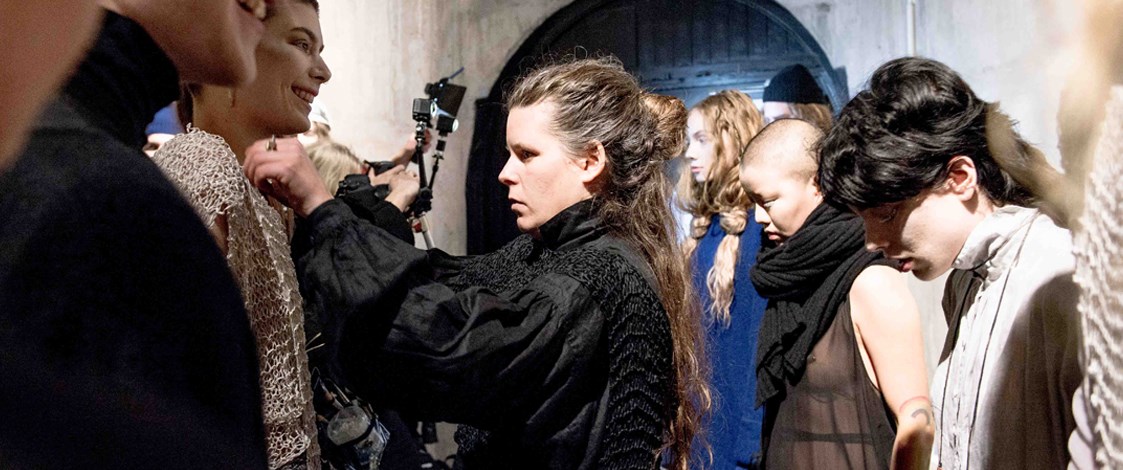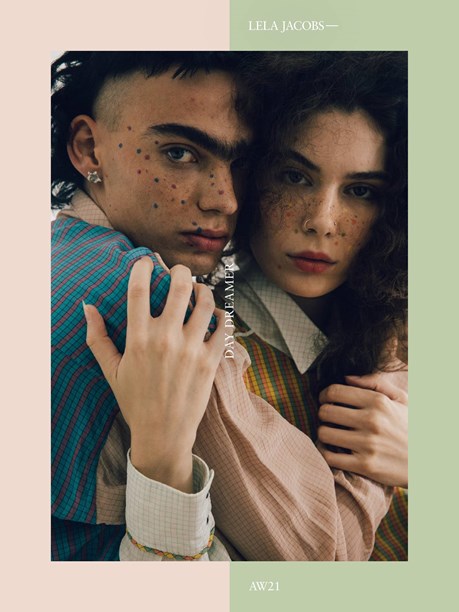Stories
Lela Jacobs
1980 -

Lela Jacobs says she is not just a designer of clothes but also the designer of her life, and both demand constant negotiation. Sustainability and the joy of hands-on making are her goals, but sustainability is more than limiting your carbon footprint, it is also about nourishing your body and your creative energy. How to earn a living and live well?
Born on the land in Cheviot, Lela spent her first months there, followed by time in Kekerengu and Upper Moutere before moving islands where her parents and two sisters settle at Ngati Manuhiri (Brick Bay). Lela appreciates this as a highly formative time, as caretakers of a large amount of land and many animals including her best friends; a horse called Ruffles and a goat called Chewy Curly Didsbids. Her childhood years spent in nature and coastal locations continue to resonate in her life and creative practice.
Image 1: Ishna, Tashina and Lela with their father John. Image 2: Mother Christina and Lela.
When her parents separated, she moved with her mother and sister to the sea at Brighton where her mother created a niche for herself selling second-hand clothes first as Tina’s Turntables and then as Lilies on the Pier. Here her mother taught her about handling, repairing, altering, and deconstructing clothing, giving Lela an entry into the complexity of garments, their materiality and their make. It also got her started with sewing and commerce and by the age of 13, she was earning a little income helping Sonja Smith in her small studio in Christchurch/Otautahi city.
Unsatisfied with the formal educational system, Lela left school at 15 and continued her nomadic ways between Christchurch, Nelson, Wellington, Auckland and Melbourne, always with a sewing machine at hand to earn some money and keep learning. In 2001 she settled a little, enrolling in a trade training course in Industrial Machining in Wellington, and the following year she applied for and got a $12,000 Government Start-up grant. With this, she was able to buy industrial sewing machines and fabrics and to launch her own eponymous label. During this time she also did an internship with Hank of House of Hank where she learnt valuable skills for cutting both production lays and made to measure.
Originally, just selling from her home studio, she had a strong belief that it was about more than just items of clothing, that her work was about giving form to ideas. To communicate that, she created shows and events and dressed artists and musicians for their performances. Her own first show was at Sandwiches, a nightclub she used to frequent.
Soon Lela was on the move again this time to Paekākāriki where she set up a small store and open studio called Raven vs Pony with some friends. Three years later she was back in Wellington and presenting her collection School of Shadows at an art gallery with the models standing on plinths. It was here that her work caught the eye of Ange Gordon. Now the owner of The Service Depot, Ange was and remains, a committed supporter of Lela and of new talent and brands, offering them retail space and exposure opportunities. In 2009 Ange hosted This Crooked Way, with live music by local band, The Glass Volts. It remains one of Lela's favourite solo shows.
In 2010 Lela's next move was to Auckland, and in 2011 she opened her space on Karangahape Road. Called The Keep, it is a flexible hub rather than a conventional shop and provides an open studio in which she continues to grow in her creative practice and build on the relationships she has cultivated with artistic collaborators and muses.
Image 1: The Keep boutique interior, 2021. Image 2: Collection - The Keep. Photographer - Sara Orme. model - Sam Norton. Hair and make up - Chanel for Stephen Marr, Serenity for MAC.
While it is functional as a retail space, it is also her flagship in other ways, offering a window to her methodology. Over the decade she has been there it has included a workroom setup including a large cutting table, an exhibition and gallery space, a live performance space, a photographic studio and a maker space for 3D printing architecture and ceramics. The Keep has allowed her to actively pursue her explorations and hone her design philosophy which seeks to minimise the environmental footprint of her fashion making. It has also provided the impetus for expanding her range creatively, with adventures into painting on textile and even casting her own coat hangers for the shop when she couldn’t purchase anything that aligned with her aesthetic and sustainability ethos.
Image 1: Collection - Riders on the Storm. Contribution- John-Troy O'Sullivan - Collar and Crown. Photographer - Sara Orme. Model - Sam Norton. Hair and make up - Caitlin Lomas for MAC. Image 2: Collection: Post Dystopian. Contribution - Colleen Behrens and Christopher Duncan. Photographer - Calipso Pioli. Model - Jin. Hair and makeup - Tony Thorne, Caitlin Lomas.
The last 15 years have seen Lela realise her collections by exchanging skills and working with other creative makers such as weaver Christopher Duncan, knitter Colleen Behrens, visual artist Ann Shelton, jeweller Welfe Boyer, and significantly her partner of 10 years, John-Troy O'Sullivan, who has played a creative role in most of the collections. The constancy of her muse, friend and artist Sam Norton, who has been photographed for many campaigns, imparts qualities of slowness and loyalty that Lela sees as essential to her point of view.
Live shows and campaign photography form an important part of the storytelling of each collection as they capture and present its essence. Both strategies provide another platform for fruitful collaborations with photographers, hair and make-up artists, graphic designers and performers such as DJ Lotion who collaborates on a mixtape to accompany each season. According to Lela, “it takes more than one person to build a good pencil that's for sure".
Over the years Lela has participated in New Zealand Fashion Week as part of AOK, a group show of Karangahape Road designers and also independently with solo on- and off-site showings. Significantly her most recent shows have drawn on her relationships in the neighbourhood. Her next-door neighbour, Starkwhite Gallery provided the venue for -endtoend- in 2018 and her 2019 show MMMMM was delivered as performance in The Keep itself. With guests invited to one of three performance times, they were hosted before their scheduled show by local bar, Madame George.
Photos from the runway show for collection -ENDTOEND-, hosted at Stark White Gallery. Image 1:Contribution - Courtney Perham and Brigid O'Connor. Photographer- Ishna Jacobs. Models -Unique Model Management. Hair and make up - Tony Thorne and Amy Elgar. Image 2: Contribution - Stark White Gallery. Photographer - Ishna Jacobs. Image 3: Campaign image for -ENDTOEND-, Contribution - John-Troy O'Sullivan. Photographer - David James. Model - Sam Norton. Hair and makeup - Willis York.
The winter 2021 collection, Day Dreamer also draws heavily on the local. Karangahape Road and its surrounds was one of the hubs of garment manufacturing in the 1970s, 80s and into the 90s, with garment factories like Classic and suppliers of fabric and haberdashery like Charles Parsons, as well as suppliers of specialist services such as buttonholing and machine embroidery. A few remnants still cling on and one of these was the source of the dead stock narrow width bolts of checked 1980s silk that is central to that collection. In a continuation of this theme, Lela has restricted 100% of the new upcoming season, titled MILK+ASH, to using only dead stock, a lot of which is again from the 1980s.

Collection - Day Dreamer. Contribution - Judi Clements and Christoper Duncan. Photographer - David James. Models - Max de Vriess and Hope Doesn't wear Pants. Hair and make up - Lauren Gunn and Jemma Barclay.
Lela loves textiles and it is the material that starts her process. Before she gets underway with a material she gets to know it. She says she needs to experience it, “I feel it, smell it, rip it, wash it, put it through the dryer. I ask it - what are you? what do you want to do? what do you want to be?”
Her materials of choice are natural fibres, silk, cotton, linen, wool and recently, possum. The intentionality of her design process is to value and respect the materials; the earth and water that grew them and the labour that has transformed them into textile and into garments. That considered approach informs her aim of carbon minimisation by working locally and by applying zero waste pattern making. Her making response is a hands-on process of folding, draping, cutting and moulding, so the structure of her clothes is quite minimal and fluid on the body and across genders. Layering and adjustable ties offer scope for the individual within her garments, allowing all of her clients to be the designers of their own clothes and their lives.
Text by Doris de Pont.
Banner image: Collection - BEINGIDLEBEING. Contribution - Colleen Behrens. Photographer - Ishna Jacobs. Models - Unique Model Management. Hair and make up - Colleen Colleen and MAC.
Published October 2021.